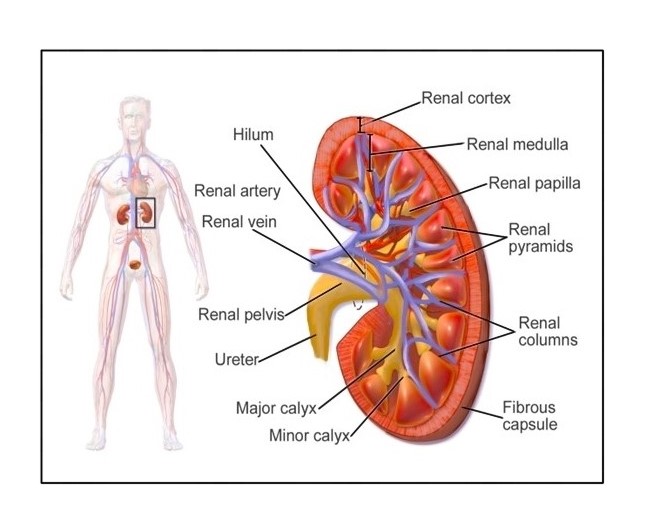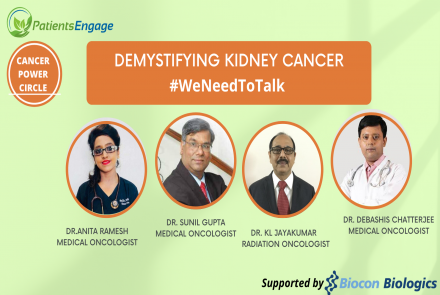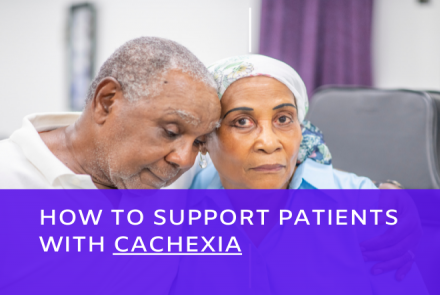
Kidney cancer is not a well known cancer. People hardly talk about it. According to GLOBOCAN 2022, yearly incidence of kidney cancer in India is 17,480 with 5 year prevalence of 1.4% per 1 lac population. Number of deaths are 9897. This indicates that patients come in late and if they came early, they would have better chance of survival. Let us go through some frequently asked questions about kidney cancer in this article.
What is kidney cancer?
Kidney cancer is any cancer that affects the kidneys and can occur at any age. In young children, a common type is Wilms tumor, while in elderly people in their 60s, renal cell carcinoma is more prevalent. Kidney cancer involves a cancerous mass arising from the kidney and can affect both children and older adults. Additionally, those with a hereditary predisposition may develop kidney cancer at a younger age, even in their 20s or 30s.
What are the functions of the kidneys, and how does cancer affect their functioning?

Image 1 – Kidney anatomy
The kidney is a vital organ in the body, consisting of a pair of bean shaped organs situated on either side of the spine, below the rib cage in the back. The kidneys have several functions, including excretion of unwanted products, maintenance of salt and metabolite balance, Vitamin D metabolism, calcium management, and erythropoiesis, which is the regulation of hormones crucial for hemoglobin synthesis and blood formation. When kidney cancer occurs, all these functions are affected and inhibited. It results in elevated urea and creatinine levels along with alterations in potassium, sodium, and calcium levels, and causes anemia. Thus, there is structural and functional damage to kidneys due to cancer.
What are the risk factors for kidney cancer?
The risk factors for kidney cancer are as mentioned below:
- Smoking is a major risk factor for kidney cancer as well as many other cancers.
- Obesity and hereditary predisposition.
- High blood pressure is also a common risk factor.
- Individuals working in industries such as asbestos, cadmium, dealing with petroleum products are exposed to toxic compounds that may lead to kidney cancer.
- Chronic conditions like osteoarthritis, rheumatoid arthritis or chronic musculoskeletal pain can lead to prolonged use of analgesics, which may damage kidneys.
- Cystic disease of the kidneys increases the risk of developing kidney cancer.
- Patients with Hepatitis C.
- Sickle cell disease patients may develop kidney stones, which increase the risk of kidney cancer.
- Childhood cancer survivors who have received chemotherapy have a higher risk of developing kidney cancer later in life.
- Patients with chronic kidney disease have a higher risk compare to general population.
What are the signs and symptoms of kidney cancer?
There is no perfect early sign that can detect kidney cancer at earlier stage. Thus, it is difficult to detect in its early stages. Let us know more on certain signs and symptoms,
- Accidently discovery of blood in the urine during examination for another reason.
- Increase in the kidney size, detected during examination. Particularly mothers may feel abdominal mass in the children.
- Any form of abdominal pain in kidney area or persistent pelvic pain.
- Testicular swelling in men
- Hematuria can occur in the beginning, throughout or at the end of urination. It can occur without specific timing and this is a significant feature everyone should be aware of for kidney cancer.
Who is most affected? Is there a growing concern in India for kidney disease?
Kidney cancer predominantly affects male in a two-to-one ratio. It is not that female never suffer from kidney cancer, but it’s more common in men and the reason is unknown. Wilms tumor childhood cancer is more common in boys than girls and generally presents within the first five years of age. In the older age group, the average age for a kidney cancer diagnosis is above 60 years. But it can also occur after 45. Though it is not as common as oral cancers, lung cancers or breast cancers, the incidence of kidney cancer is slowly growing in India due to lifestyle disorders rather than genetic factors.
What are the various types of kidney cancer?
- If the cancer is occurring inside the kidney, it is adenocarcinoma. That is sub divided into two categories: clear cell and non-clear cell. About 60 to 70 percent cases are typically clear cell, while the rest are non-clear cell.
- If it is in the renal pelvis, then it could be transitional cell carcinoma or urothelial carcinoma. It starts where ureter and kidney meet. It can look like bladder cancer.
- Conventionally, kidney cancer is referred to adrenal carcinoma when it happens in the renal tubes.
- If the cancer is developed in connective tissues of the kidney, it is identified as sarcoma.
What are the stages of kidney cancer?
Stage I – The cancer is confined to the kidney. Radiologically the nature of tumor, whether it’s solid or cystic, is evaluated. The tumor size and perinatal fat involvement is examined.

Image 2 – Kidney cancer stages
Stage II – The cancer has grown larger, indicates a more advanced stage.
Stage III – The cancer has spread to nearby lymph nodes.
Stage IV – The cancer has metastasized to distant organs such as bone, lung, liver or brain. Ascites can occur in case of fluid accumulation in abdomen indicates advances stage of the disease.
How is kidney cancer diagnosed?
Kidney cancer is diagnosed through medical history review, physical exams and various diagnostic tests.
- Doctor will do physical examination to check for any lumps or any abnormal enlargement.
- Urine test to detect blood or other signs of kidney problem.
- Blood tests to access overall kidney function.
- Imaging tests such as ultrasound, CT scan and MRI helps visualize the kidney and detect any tumor or abnormalities. Suitable imaging test is recommended by your doctor based on requirement. A CT scan is usually preferred to avoid radiation exposure.
- In the early stages of kidney cancer, a biopsy may not be recommended due to the risk of cancer cells spreading along the path of the needle. In most cases, a solid mass in the kidney larger than 3 cm has to be excised.
Does kidney cancer always affect both kidneys? Or does it affect only one kidney?
Most of the time, kidney cancer will affect a single kidney. If it is diagnosed at an early stage, a partial nephrectomy or a total nephrectomy can be done. Patient will still have one kidney to survive.
What are the various treatment options for kidney cancer?
Kidney cancer treatment is decided based on its advancement. If the tumor is confined to the kidney and has low volume, radical or partial nephrectomy can be indicated.
- In stage I where surgery is possible, after nephrectomy or partial nephrectomy, the patient needs to be in close surveillance with doctor.
- Presently, no surgery policy is applicable for almost 90% of kidney cancer cases because they are identified in late stages.
- In stage III where the cancer has extended to nearby lymph nodes, targeted therapy or immunotherapy is beneficial for reducing the chances of recurrence.
- For stage IV disease, if surgery is not an option, targeted therapy and immunotherapy is the only choice of treatment.
- Immunotherapy is a type of cancer treatment that helps immune system to fight cancer. It works by “unmasking” the tumor and activating the body’s immune cells to attack the cancer cells.
- If the disease has spread to other organs such as brain, liver, and other organs in high volume or short time, surgery is not preferred as it can’t impact survival. It has not been shown that doing surgery will provide any survival benefit.
- Radiation therapy may be used to alleviate symptoms and improve quality of life in advanced kidney cancer cases. It can help relieve pain, reduce the size of tumor and control bleeding in metastatic cancers. It can be used as combined therapy with other treatment modalities to improve treatment outcomes.
- Sometimes where kidney cancer recurs locally after surgery, radiation therapy is recommended to provide local control and target the recurrent tumor.
Read more on - https://www.patientsengage.com/news-and-views/demystifying-kidney-cance…
What are the various treatment advances in kidney cancer?
Almost 15 years ago, successful surgery for early stage cancer offered excellent short term cure. Most cases were diagnosed at an advanced stage, as early detection for kidney cancer was rare due to its complexity. Kidney cancer was considered chemo - resistant and chemotherapy had limited effectiveness.
About a decade ago, stage IV kidney cancer survival was around 1 to 1.5 years. However, over time, targeted therapy and immunotherapy have evolved as effective treatments. These advancements have led to significant improvements in survival rates, nearly tripling on average. Kidney cancer treatment now begins with a combination of targeted therapy and immunotherapy without mutation testing. Second-line and third-line treatment options are also available based on the patient’s response to treatment. Patients with stage IV kidney cancer can now survive for 5 years or more and have treatment options that can prolong life with a good QoL.
What are the complications of kidney cancer treatment?
There can be disease induced complications and treatment induced complications.
- Disease induced complications include fatigue, anemia, hematuria, edema, protein loss, flank pain and swelling, weight loss, loss of appetite, hypoalbuminemia and depression.
- Treatment induced complications are cachexia due to side effects, depression, mucositis, ulceration, low platelets and hemoglobin, fatigue, weakness, loss of appetite.
- Lifestyle modifications such as light exercises and healthy diet can manage fatigue.
- Anemia need careful management during the treatment.
- Bone pain or abdominal pain may decrease after the treatment progresses as the size of tumor decreases. Painkillers are prescribed if required.
How to manage complications - https://www.patientsengage.com/news-and-views/demystifying-kidney-cancer-key-webinar-takeaways
How should older patients with pre-existing conditions like diabetes or heart disease manage both their cancer treatment and their other condition?
Patients with pre-existing conditions should continue their previous medications as there is no significant interaction between the drugs. Any new side effects such as blood pressure or thyroid level changes must be monitored and managed by the treating physician. It is important to adjust doses as necessary and keep monitoring overall health, including blood pressure and blood sugar.
How to reduce recurrence of kidney cancer?
There is no guaranteed method to prevent recurrence. Maintaining a positive outlook and trusting the process is crucial. Following standard treatment protocols and post-surgery treatments may help reduce the risk of recurrence. Hydration and a healthy diet also play an important role. Quitting tobacco and alcohol is essential after treatment to reduce the risk of recurrence. Adhere to follow up protocols as regular imaging tests may detect any recurrence early.
Tips for kidney cancer patients and caregivers for management of kidney cancer.
Living with kidney cancer can be challenging, and it’s natural to feel anxious and stressed at times. But celebrate the victories, and don’t let setbacks discourage you.
- Trust your healthcare team.
- Stay updated with the latest advancements in treatment and make informed decisions.
- Maintain a healthy weight. Stay physically active with light exercises to manage fatigue and weakness.
- Eat healthy and hygienic food. Strict dietary restrictions can be avoided, but there should be enough healthy options available for them.
- Quit tobacco and alcohol.
- Continue regular medications for other chronic conditions, such as hypertension or diabetes.
- Go for regular follow up and monitoring. Ask your doctor immediately if you experience any side effects.
- Regular consultation with your oncologist and physician is important.
- Caregivers should avoid being overly protective. Give patients enough freedom to meet their friends and allow them to travel, which can boost their morale.
- Emotional support from caregivers and family is crucial for patients to manage the situation better.
How to prevent kidney cancer?
- About 5% to 8% of kidney cancers are inherited. There are various syndromes and associated symptoms with kidney cancers, which manifest at an early age and have a familial predisposition. A proper family tree analysis and genetic counselling are essential in such cases.
- If you notice symptoms such as abdominal mass or hematuria, consult urologist immediately.
- Most tumors, including kidney tumors, are initially painless. Do not ignore any lump and seek medical advice.
- Maintain a healthy weight with healthy diet and physical exercise.
- Say no to smoking and alcohol
- Maintain good hygiene to support the immune system.
- Routine vaccinations should be kept up-to-date.
- Drink plenty of water throughout the day to keep your kidneys functioning properly.
- Focus on gathering acute information and making informed decision about your health.
- Do not hesitate to engage with different doctors and take opinions.
- Always remember you are not alone in this journey.
By following these preventive tips, you can help reduce your risk of developing kidney cancer and maintain overall health and well-being.
References:
- https://www.wcrf.org/cancer-trends/kidney-cancer-statistics/
- https://gco.iarc.who.int/media/globocan/factsheets/populations/356-indi…
- https://www.patientsengage.com/news-and-views/demystifying-kidney-cance…
- Navigating treatment of kidney cancer - https://www.youtube.com/watch?v=TeX_Gi_f0-A&t=700s
- Kidney cancer: Know signs, symptoms and risks - https://www.youtube.com/watch?v=ToDhSELxyCU
- Living well after kidney cancer - https://www.youtube.com/watch?v=Zumiq3BvaPs&t=863s















